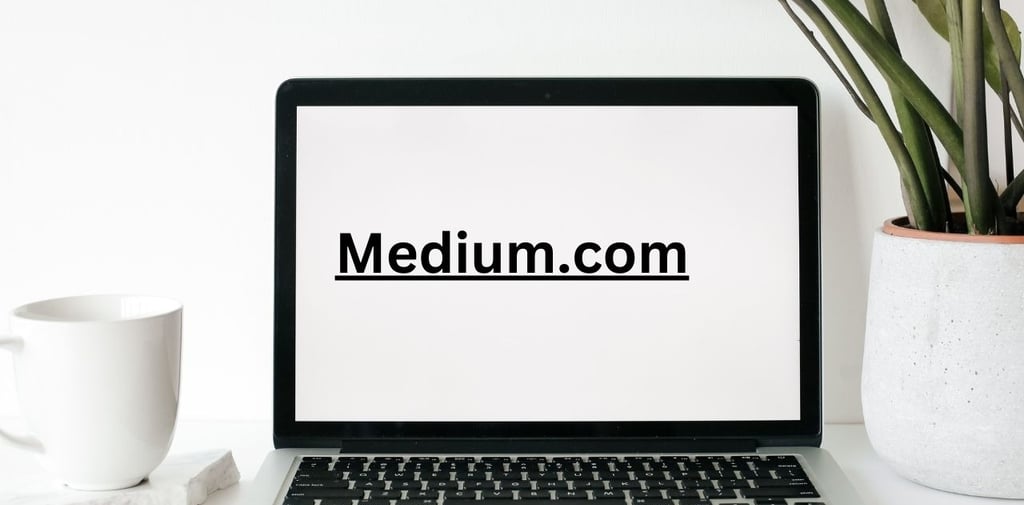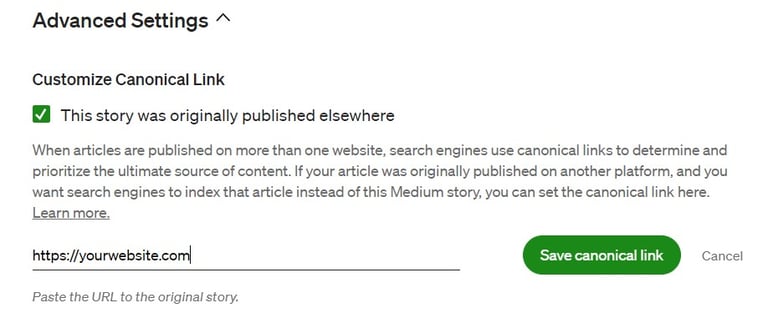Posting on Medium: Maximizing Impact Without Affecting Your Website Ranking
Learn how posting your blog on Medium can affect your website ranking in Google. Find out how to avoid duplicate content penalties and drive traffic back to your website.
8/24/20235 min read


You're a passionate blogger with a wealth of insights to share, and you've likely considered Medium as a platform to amplify your voice. But, that lingering question remains: Could posting your blog on Medium influence your prized website's ranking on Google? Let's delve into this and discover the truth.
The Nuanced Answer
When it comes to Google's intricate algorithms, duplicate content can be a red flag. If you're thinking of merely copying and pasting your blog post onto Medium, beware! Google might interpret this as repetitive content, potentially leading to a drop in your website's ranking. However, a clever workaround is to adapt your content for Medium. Rewrite, rephrase, and reframe your thoughts – this can significantly reduce the risk of Google's penalization.
The Traffic Advantage
But wait, there's a twist. Sharing your content on Medium doesn't have to be a double-edged sword. If you can attract substantial traffic from Medium to your website, Google takes note. A surge in traffic suggests your content resonates with audiences, possibly resulting in a positive impact on your website's ranking. In essence, Medium can become your ally in the quest for higher search result placements.
Quality Content Prevails
The content's quality, of course, is the star of the show. Google values informative, high-quality content. So, even if your article graces both your website and Medium, as long as it delivers value and expertise, Google is less likely to frown upon the duplication.
Navigating the Medium Maze: Actionable Steps
1. Revamp for Medium: Craft a Medium version that maintains the essence but offers fresh insights.
2. Promote Synergy: Promote your Medium posts on your website and across your social media platforms to drive traffic back to your site.
3. Optimize with Care: Employ SEO strategies on Medium – use pertinent keywords in titles, meta descriptions, and content itself.
4. Master the Rel="Canonical" Tag: This HTML tag communicates the original content source to Google. It's like a VIP pass for your content, ensuring the right version takes the spotlight.
5. Expert Consultation: When in doubt, consult an SEO expert for tailored guidance.
The Rel="Canonical" Tag: Your Content's Guardian Angel
Picture this: You've posted your blog on Medium, and it's a hit. Yet, you're cautious about its impact on your website's SEO. Here's where the rel="canonical" tag swoops in as a superhero.
This tag helps Google distinguish the prime version of your content and, in turn, enhances your SEO strategy. Picture having multiple copies of your content – a common occurrence. The rel="canonical" tag firmly points Google toward the original, maintaining clarity and optimizing your rankings.
Implementation is a breeze:
1. Navigate to Your Medium Article
2. Click the Three Dots in the top-right corner
3. Select "Edit Story"
4. Find "Advanced Settings"
5. Tick "This story was originally published elsewhere"
6. Insert the Original Article's URL
7. Click "Save canonical link"
Voilà! Google now recognizes your website's version as the star of the show, diminishing any negative impact.
Leveraging Medium's Strengths
Here's a nugget: Medium boasts a robust domain authority – Google respects its credibility. With its extensive, engaged readership, your Medium posts can shine in search results. Plus, the platform offers a gateway to new audiences, a definite win for your content strategy.
Embrace Medium's Power
In the grand scheme of things, the Medium dilemma isn't as bleak as it seems. By wisely adapting your content, employing strategic optimization, and embracing the rel="canonical" tag, you're on the path to SEO success. So, go ahead and wield Medium's power to your advantage – your website's ranking might just thank you for it.
Expanding the Horizons: Medium's SEO Landscape
Now that we've traversed the essentials, let's delve deeper into Medium's realm and its implications for your website's SEO. It's not just about balancing duplication fears and capitalizing on traffic influx – there's more to unearth.
Medium's Impact on Domain Authority
Medium's formidable domain authority can't be ignored. Google acknowledges Medium as a credible source, and this acknowledgment rubs off on your posts. When you publish on Medium, you're tapping into this authority, potentially giving your content an SEO boost.
The Enigma of Engagement
Engagement is the name of the game in the digital realm, and Medium has it in spades. The platform's engaged readership interacts with your content, signaling to search engines that your words resonate. Higher engagement can contribute to enhanced visibility and, consequently, improved rankings.
Backlinks and Their Magic
Backlinks are the building blocks of SEO, and Medium can become a conduit for these valuable links. When readers find your Medium content appealing, they might reference it in their own blogs or articles, creating backlinks to your website. These backlinks, coupled with Medium's domain authority, can potentially bolster your website's SEO efforts.
The Long-Tail Keyword Advantage
Medium allows you to target long-tail keywords – those specific, longer phrases that users type into search engines. By crafting Medium posts around these keywords, you're optimizing for more specialized search queries. This can lead to a stream of targeted traffic, benefitting both your Medium presence and website.
A New Audience Frontier
One of Medium's inherent strengths is its ability to introduce your content to new audiences. Your blogs have the potential to be discovered by individuals who might not have stumbled upon your website otherwise. This wider reach can contribute to enhanced brand recognition and even attract more visitors to your website.
A Unified Strategy for Success
As you navigate the dynamic landscape of Medium and its impact on SEO, remember that a unified strategy is key. Balancing the adaptation of content, the utilization of the rel="canonical" tag, and the amplification of engagement can collectively pave the way for SEO success. The symbiotic relationship between Medium and your website isn't a zero-sum game – it's a partnership with mutual benefits.
Final Thoughts: Seizing the Medium Opportunity
In a digital ecosystem brimming with possibilities, Medium emerges as a compelling arena for your content. The myths of duplicate content and negative SEO impact can be dispelled with thoughtful approaches. Adapt, optimize, and embrace Medium's unique advantages, all while keeping your website's ranking intact.
So, take the plunge – explore Medium as an extension of your content strategy. When wielded effectively, Medium can magnify your reach, amplify your voice, and yes, even boost your website's SEO prowess. It's a journey of discovery, strategy, and synergy – and the destination holds the promise of enhanced visibility and success.
Set up your online business in just 15 days with $7


Subscribe TO GET NEW POSTS DIRECTLY IN YOUR INBOX!
©2026 MoneyMedia101. All rights reserved.
